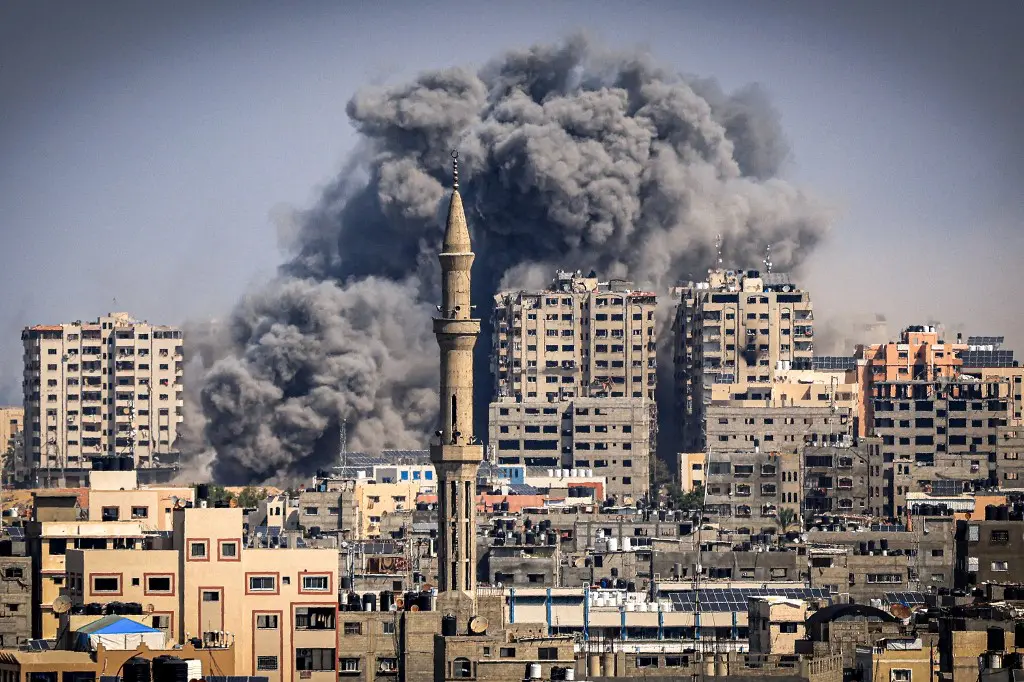An editorial piece on the intricate interplay of words and actions in the midst of the Gaza crisis, examining historical contexts and power dynamics.

Ronald E. Kon – Deputy Editor-In-Chief
When desperately contemplating Middle Eastern culture the proverbial topos “The pen is mightier than the sword” comes to mind. That counts for present-day culture inasmuch as it has borrowed, perpetuated and immortalized this saying from preceding, now extinct, regional cultures.
From the same area we have come to endorse the crystallized “Thou shalt not kill” from the Torah, and wisdom enshrined in phrases like “Do not do unto others what you would not have done to yourself.” Sura 5:42 and verses to the same effect equally apply.
Nevertheless, it has proven to be difficult, when discussing the present crisis in and around Gaza, to find words that will not be victims of the sword, and will not be overtaken by time.
Any analysis, any recommendation, any opinion might prove to come too early in the thick of the fight (and who knows what apocalypse is still pending: I hold my breath).
Perhaps we should restrict ourselves to those words that contain elements of consolation and –if that is not too much asked for- understanding, without pointing fingers and accusing. “Understanding” is not per se a synonym for justification, and condemnation is a comprehensible primal reaction.
Those words should be supported by, and describe, proven truths, and not per se apply all too easily –in the wake of understandable emotions- designations of the other as (… fill in your favorite). Only gradually have spokespersons for governments come to the conclusion that in case of a conflict or a crisis there is more than just one party involved, and that there is more than one flag symbolic of a suffering population in need of recognition and rights.
And of course, there are many more flags in the wider region that deserve our attention, all victims of geopolitical developments. There is some consolation in the fact that the observed selective outrage and one-sidedness of initial one-dimensional and un-evenhanded reactions is abating.
It looks as if words and the realities behind them no longer synchronize with deeds: UN resolutions, designed to formulate solutions for mutually excluding claims on territory and the truth, jump to mind. Who could have been so blind as not to see coming, in light of these resolutions adopted by, and remaining dead letters for, the international community, the present day developments and outbreak of violence, in the pressure cooker that is Gaza, a stone’s throw away from the bordering area where, in kibbutzim, a totally different life was lived? Who wants to be taken seriously and maintains at the same time that what happens now is a first step in a cycle of events that, however, have been going on for decades? Who can believe that the widely acclaimed security services (plural) of Israel, where security, surveillance and survival play such an important role, did not see these developments coming? Rumor has it that the government had been warned well in advance by Egypt for what actually happened.
History will prove if also here, considering motifs and means, propaganda, fake news, manipulated images and constructed truths play and played a role. It is, however, not impossible that ignoring (on purpose?) warnings played a deliberate role. Of course, as a step further in this style of reasoning: a self-induced tragedy is too conspiratorial –and not rational- to be taken seriously and therefore belongs to the realm of fantasy.
Words like “hallucinatory”, “schizophrenic” and the likes of them from the dictionary of psychiatry impose themselves. Historical terms from the period leading up to, and reminiscent of, WW2 lose their exclusive application, and can now also be applied to present-day victimized populations.
Hamas, Sunni as it is, has, in its irrational application of an attitude that could be described with the Shi’i martyrdom terminology as “redemptive suffering”, proven not to adhere to world-wide accepted notions of “humanity”. Israel’s reaction counterbalances and mirrors this lack of reasoning about cause and effect.
If, indeed, the pen is to become mightier than the sword, we should invest hope in the restoration of a fully fledged Supreme Court in Israel, in the authority of organizations like the International Court of Justice (ICJ), and the International Criminal Court (ICC), as far as applicable. Peace Enforcement and Peace Keeping Operations, including troop separation agreements, could be considered. Only then, it seems, can deserved rights be restored.
In the end the pen will be used for more than texts on banners, obituaries, inscriptions on tombstones or algorithms that mould our thoughts and structure our decisions. Hopefully, then, sharpened pens will equally be used to write election programs, ballot-papers, peace treaties, and well balanced texts in history course books.
May, until then, all victims rest in peace.


